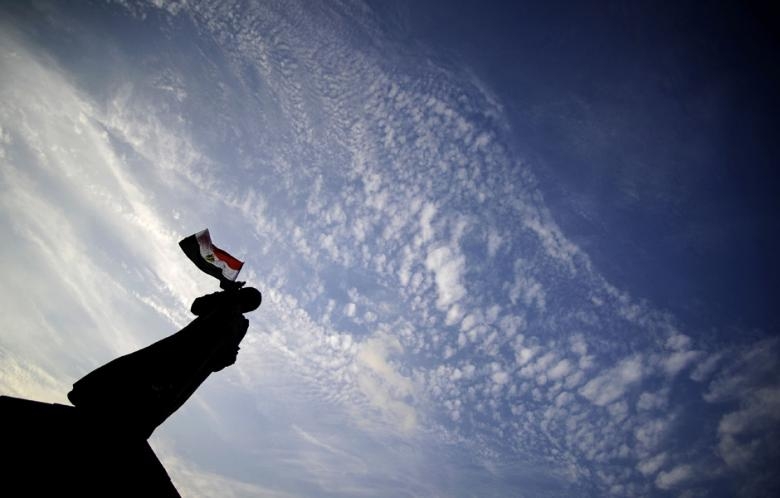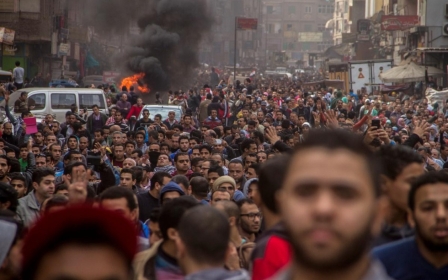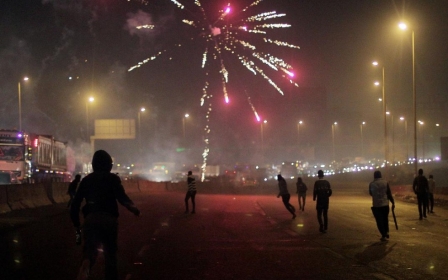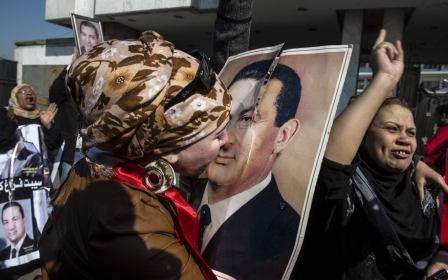Egypt's 25 January uprising - four years on

As on any other night, Metwali, a young man in a middle-class suburb of Cairo, was sitting at his neighbourhood coffeehouse on 25 January, 2011, catching up with friends’ news and gossip. It was in that peaceful setting that he heard of the protests and clashes going on in Tahrir Square.
Later, after watching what was being broadcast on Egyptian TV that evening and the next morning - scenes of cooking shows and peaceful panoramic views of Cairo devoid of any sense of an uprising - Metwali (not his real name) was struck by the contradiction between the TV broadcasts and his friends’ accounts of events on the streets and decided he had to get out and participate.
He called his best friend and told him: “If they’re trying to hide what’s really going on in Tahrir, there must be something wrong. They must be cooking something up, and trying to blindfold us.
“Let’s go out, and get the change we deserve,” he told his friend. “Our brothers are being attacked and killed and they need us.”
Only knowing one president his whole life, 26-year-old Metwali wanted a chance to take democracy into his own hands and make change happen.
So on 26 January he joined the thousands of Egyptians across the country - men, women and children - who would battle police forces for 18 days with the slogan “aish, huriya, adala igtimaeya” (bread, freedom and social justice). The thousands, reaching out to grasp the freedoms and standards of dignified living that they had long hoped for, swelled into millions to bring down their despotic president, Hosni Mubarak, and his regime. At least 846 people died in the course of those 18 days.
In that first day of his involvement in the protests, the chants escalated to “hukm Mubarak batel batel” (Mubarak’s rule is void, void), but in the middle of the crowds around Tahrir Square Metwali lost his best friend then became caught up in a scuffle with the police as he searched for him.
The police beat Metwali with batons and shoved him and 37 other men into a police van that should have held 15 people at the most, he says. Crushed together, they spent more than six hours in the poorly ventilated van, seeking what air they could from the few narrow spaces in the barred openings to the outside. Many of those around him fainted.
Eventually they were put into a jail cell, though again one far too small for the number of detainees.
“Most people slept standing up because there wasn’t enough space to lie down,” Metwali said. “And more than 230 people urinated in one bucket because no one was allowed out of the room for two days, except for interrogations.”
Detainees had to pay for the little food - one “cheap” meal in those two days - that was on offer.
To keep spirits up, Metwali sang out with his new jail-cell friends the revolutionary chants he had learned in the Square and old nationalistic songs - singing particularly loudly whenever a police officer came in.
One of the detainees he got to know was a 16-year-old boy, who told him that he had left his downtown Cairo apartment building earlier that day to buy medicine for his grandmother. When he came out of the building, the boy was surprised to see a stampede of people running past and being chased by police. The young bystander was promptly scooped up and arrested.
Metwali, released from jail after about 48 hours, caught a glimpse of the best friend he was looking for. He had also been arrested.
Their welcomed release came with a prison guard’s warning: “We’re emptying the prisons for tomorrow’s people. If you get arrested tomorrow, you won’t come out again.”
The “tomorrow” in question, 28 January, came to be known as the “Friday of Anger”. The police were apparently expecting a large number of new detainees as the Muslim Brotherhood, Egypt’s largest organized political force at the time, was expected to join the protests.
Four years, two elected presidents and six prime ministers later, with little hope for democracy in the air, the now 30-year-old Metwali is soon to leave Egypt. “Even though it’s my home, and I’ll always love it, it’s just too depressing and self-destructive to stay,” he says. It’s a feeling many share.
In the past two weeks, and in the lead up to the fourth anniversary of the 2011 uprising, Mubarak has gone from pharaoh to phoenix. A life sentence for ordering the killing of protesters during the uprising that toppled him was overturned in 2013, and a retrial quashed the charges in November 2014. The last conviction against him, on charges of corruption, was overturned by a Cairo court on 13 January. The court ordered a retrial, but in the meantime the 86-year-old should walk free pending formal release procedures, lawyers have said.
On 22 January, a Cairo court also ordered the release of Mubarak’s two sons, Alaa and Gamal, pending a retrial.
While they can walk free, Tahrir Square, the symbolic heart of the uprising, is again marked by signs and sounds of repression. It was closed off by army tanks and police vans on the eve of this year’s 25 January anniversary, and a woman protester, the liberal activist Shaimaa Sabbagh, was shot dead near the Square.
The Socialist Popular Alliance said that party member Sabbagh was killed by security forces. Images emerged on social media of Sabbagh carrying a crown of flowers to Tahrir Square when the shooting occurred. The day before, on 23 January, 15-year-old Sondos Reda Abo Bakr was killed after clashes broke out in Alexandria.
Little has been done to hold Egypt’s security forces and governments accountable for the death of protesters over the past four years, and political freedoms continue to be eroded.
Since current President Abdel Fattah El-Sisi came to power in July 2013, more than 40,000 Egyptians have been arrested and prosecuted, according to the independent statistical database Wikithawra. It said in May that only 4 percent of arrests were related to acts of terrorism, while 89 percent were related to political participation. Amnesty International and Human Rights Watch said in June that Egypt is “in the midst of a human rights crisis as dire as in any period in the country’s modern history”.
Sisi recently said that Egyptians have the right to protest but that doing so would hurt the economy. His government’s actions show little proof that he means what he says.
Youth activists are either being killed or put in jail for protesting. Alaa Abdel Fattah, a 33-year-old blogger, was transferred to a prison hospital on 21 January after 80 days on hunger strike. He was detained in October, along with 19 others, as their retrial began for violating a strict protest law. He is one of several detainees on hunger strike in protest at their imprisonment.
Mohamed Soltan, a 27-year-old American citizen, has been held in an Egyptian prison without charge for the past 16 months. On 20 January, Soltan’s family released six photographs taken in prison that show him unconscious and with blood running out of his mouth, sores on his lips and gums, and large bruises on his hands and arms.
There are 16 journalists in jail in Egypt, according to Reporters Without Borders. Only China, Eritrea and Iran have imprisoned more. This includes the three Al-Jazeera English journalists who were sentenced to between seven and 10 years in jail in a trial widely criticized by international journalists, human rights groups and lawyers.
President Sisi, meanwhile, is looking to further legitimatize his rule internationally and attract investors. He spoke in Switzerland this week at the prestigious Davos Forum, which gathers leading political and business figures, and he received this month the UK’s largest trade mission to Egypt in over 10 years. A major economic conference is set to take place in the seaside resort of Sharm El Sheikh in March. All this dims hopes that the international community might hold Egypt’s leadership to higher standards than it has done so far.
According to Financial Times columnist Gideon Rachman, “awkward questions about the military coup that helped propel Mr Sisi to power in 2013 - and the subsequent bloodshed and repression - were not asked on stage at the [Davos] forum”. Instead, he was received with “warmth” by the international political elite. Former German politician Philipp Rösler even told Sisi: “The Davos community counts on your leadership.”
This came in the context of an international community more concerned by the threat posed by extremist groups such as Islamic State and al-Qaeda, Rachman reported, particularly in the wake of the Charlie Hebdo killings in France this month.
And yet, while it’s an old formula by now for governments all over the world forfeiting the respect for human rights when trying to combat “terrorism”, it remains a disappointing and failed approach. Sisi’s leadership is no beacon to look up to in that regard, particularly on this 25 January anniversary as peaceful protesters continue to be killed - four years on.
- Nadine Marroushi is a British-Palestinian journalist who has worked for Bloomberg and the English edition of Al-Masry Al-Youm (also known as Egypt Independent), and who as a freelance journalist has written for The National newspaper in the UAE and the London Review of Books blog. She has also been published by the Financial Times as well as other international publications.
The views expressed in this article belong to the author and do not necessarily reflect the editorial policy of Middle East Eye.
Photo credit: An Egyptian flag flies from a statue in Cairo's Tahrir Square in 2011 (AFP)
Middle East Eye propose une couverture et une analyse indépendantes et incomparables du Moyen-Orient, de l’Afrique du Nord et d’autres régions du monde. Pour en savoir plus sur la reprise de ce contenu et les frais qui s’appliquent, veuillez remplir ce formulaire [en anglais]. Pour en savoir plus sur MEE, cliquez ici [en anglais].





